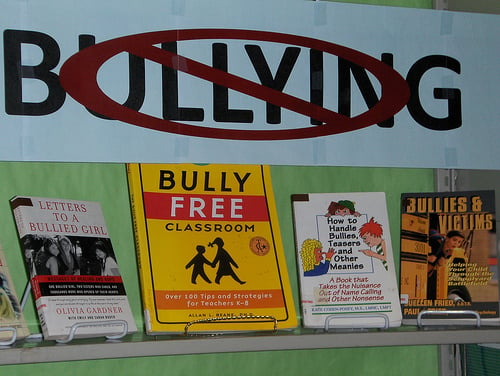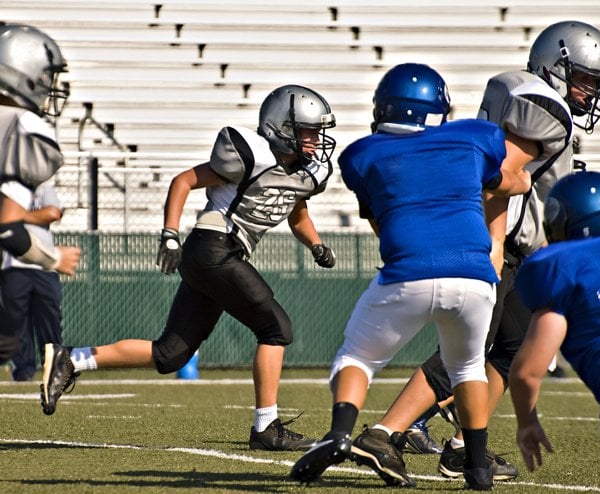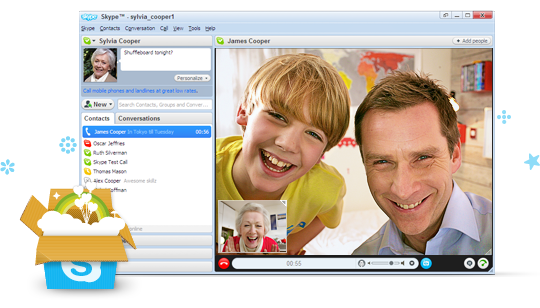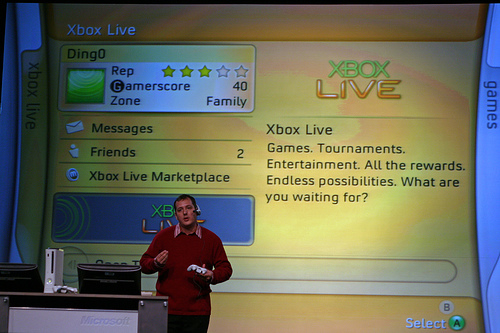In 2008, a teenage child in my extended family was victimized by an online predator on Facebook. While the child was not physically harmed, the events were serious enough that the predator was ultimately sentenced to 40 years in prison for his history of child predator crimes. Obviously, it was a traumatic experience for both the child and his family.
Read More »Benefits of Living Unplugged
The onslaught of digital duress may be stripping back the fabric of your family. It is no secret that in this age of digital everything, digital parenting has leapfrogged over so many other more traditional means of parenting. Although digital parenting is a necessary adaptation, it's important for families to strengthen communication before technology.
Read More »Is This Donut a Secret Message From Your Kid?
The issue with parenting in the digital age is that it moves at the speed of light, and kids are at the very forefront of it. They know about the latest apps weeks, perhaps months before you do, and they are quietly discussing who-knows-what with their friends via texting apps and Facebook messenger. The age of being able to eavesdrop on a conversation and get all the knowledge you ever needed is over.
While those days are over, we’ve developed a new way to keep up with our kids, and digital parents need digital weapons. With that being said, kids are starting to get a bit wise to the ways of the digital parent.
Read More »10 Ways Parents Can Prevent Cyberbullying
I've seen lots of material online and from my daughter's school about how to respond to cyberbullying. But if I can prevent it from happening in the first place, that's even better. All parents should know the top 10 ways we can prevent cyberbullying.
-
Promote self-esteem and confidence. Encourage them to find activities they enjoy and develop skills to be proud of. Confident kids are less likely to be picked on, and they're also better able to shrug off bullying if it does happen
-
Let them know it's okay to confide in you. Kids need to know that they can tell you anything – good or bad – and you won't over react.
Why Snapchat Should Terrify You
Children have more ways than ever before to communicate with their friends and family. While living in the digital age has its advantages, parenting in the digital age can be a difficult and confusing process. Each day many apps are added to digital stores. Whether your child is using an iPhone, a tablet, and iPod or an Android device, he or she has access to thousands upon thousands of applications. While many of them are harmless, there are a few apps that pose a significant risk to your child. Snapchat, is one app that, on the surface, may seem innocent enough, but can be extremely harmful.
What is Snapchat?
Read More »Lessons Learned from Cyberbullying
Unwelcome sexting, abusive text messages, digital public humiliation and social media harassment all fall under the umbrella of cyberbullying. The sobering realities of cyberbullying have become so prevalent that the Federal Bureau of Investigation (FBI) published a "Cyberbullying and Sexting: Law Enforcement Perceptions" bulletin advising agencies that "94 percent of school resource officers agreed that cyberbullying was a serious problem warranting a law enforcement response."
Sexting Is Just the Beginning
With the relatively new ability to send images and videos through technology, people of all ages are taking advantage of this ability to connect to others. Unfortunately, it has also led to the evolution of “sexting.” While this is legal for adults (but still risky), it is not for minors and can have serious consequences on a minor’s emotional state, not to mention their professional and academic future.
Depending on the minor, the situation in which the sexting occurs, and how it is handled, the ramifications can vary greatly. However, it almost always leads to some negative effects for the teen.
What It Can Lead To
While parents may be aware of certain repercussions of sexting, there are a wide variety of consequences that even the most conscientious parents may not be aware of. Regrettably, it can lead to the following negative effects:Cyberbullying on Youth Sports Teams: It Happens More Than You Think
The threat of cyberbullying isn't limited to any one group of kids. Students in the chess club are just as likely to be a victim of cyberbullying as students on the football team. If you don't believe that, then take a look at the story below.
KTTC News reported a case of cyberbullying at a local high school in Minnesota. In this case, members of the football team were caught engaging in cyberbullying. Here are some points from the case:
-
Football coaches at Southwest High School heard about instances of cyberbullying
-
Several players who engaged in cyberbullying were benched for a must-win game
-
The principal of the high school said cyberbullying can be more damaging than traditional bullying
Digital Parenting: 11 Facts About Cyberbullying
Cyberbullying is defined as a young person tormenting, threatening, harassing, or embarrassing another young person using the Internet or other technologies, like cell phones. The psychological and emotional outcomes of cyberbullying are similar to those of real-life bullying. The difference is, real-life bullying often ends when school ends. For cyberbullying, there is no escape. And, it’s getting worse. Read on to get the facts.
Calculator or Hidden App? Teens Are Disguising Content With Apps
In this day and age teenagers are more tech savvy than most adults. They chat on their smartphones with their peers, download all the popular apps and are greatly familiar with their device settings. Another recent thing that a lot of teens do on their smartphones is hide pictures, messages and apps. Find out how teens are doing this and discover what you should be looking for on teens' phones.
Hiding Apps
The most popular way to hide apps or any other content on your phone is by using an app that does that. Both Apple Store and Google Play have a lot of hiding apps for download and the majority of them are free.
Read More »Could Your Child Be an Online 'Troll'? But What Is Trolling?
“Trolling” is making inflammatory, anonymous statements on the Internet for the sole purpose of derailing an online discussion or provoking the other participants in the discussion. In other words, another way for kids to participate in cyberbullying. A troll, in Internet lingo, is somebody who does these things online. Often times you might encounter this image when searching for a “troll”:
Is My Child Watching Pornography Online?
When we think of people who are consumers of online porn, we automatically picture grown adults. However, with access to pornographic sites becoming increasingly widespread, a large number of tweens and teens are believed to have viewed some kind of online porn.
How Many Children Are Watching Porn?
Today, it's reported that at least 90 percent of kids between the ages of 8 and 16 have watched pornography online at least once. Not only have most tweens and teens seen porn, but boys ages 12 to 17 are actually the largest consumers of online pornography. With this statistic, pornography has even been compared to being the drug of choice for youth.
Read More »The 9 Most Used Cyberbullying Tactics
No one wants to see their child being bullied. As bullying has been covered more frequently by the media, it has become obvious that bullying no longer includes just the "Steal your lunch money" tactics of past generations.
7 Safety Rules for Video Chatting
Picture your favorite person in the world. It could be your spouse, your child, a parent, or a family friend. If you could speak with this person right now, would you prefer a phone conversation or an in-person one?
Of course you'd rather see their face, their expressions, and their gestures. A phone call just doesn't compare. That's why almost 2 in 5 teens have used Skype, iChat, or GoogleTalk to video chat with others.
If your teen regularly uses a service like Skype, or if he has a social networking account (most social networks have video chatting capabilities on-site), teach them these Internet safety rules for video chatting online.
6 Requirements for Managing Peer Pressure Among Kids/Teens
Peer pressure can be extremely hard to deal with for kids and teens. It becomes increasingly difficult without the support of their parents. When it comes to managing peer pressure among kids/teens, there are things that you should do, and things that you must do. Here are six such "musts" for dealing with peer pressure:
-
Talk to your child about the dangers of drugs, alcohol and sex: Talking to your child opens up a dialogue that can be very important. If your child feels safe discussing these difficult topics with you, there is a greater chance that they will come to you if they are curious about trying them.
10 Things Parents Need to Know About Xbox LIVE and Kids Safety
Xbox LIVE is the online service for the Xbox 360. With a paid gold membership and a set of headphones, your child can play online with a community of 40 million other users worldwide.
This can be seriously awesome for the gaming enthusiast in your house, but there are 10 important things parents should know about Xbox LIVE and keeping kids safe before setting it up for their child.
-
It's more than just a gaming site. Xbox LIVE users can also chat with each other, send and receive friend requests, and share their profile and gaming stats.
Sex Offender Monitoring Apps Every Parent Should Have
We already know that there are a plethora of online resources available to inform parents about the residence of sex offenders. With the integration of these registries and apps, parents can stay up-to-date on the sex offender registries.
Sex Offender Search App- This App is great for families looking for a new home. You can use the App to put in the address of a house you're interested in and a map will pop up, showing you if there are any sex offenders in the area. The same goes for your child's school; virtually anywhere in the US is available. You can also get alerts through emails and text if a new offender comes into your area.
Understanding Cyberbullying: Why It Happens and How To Prevent It
In recent years, the news media coverage has exploded with tragic stories and consequences of cyberbullying. Cyberbullying is defined as bullying that occurs over electronic devices, often through texting, email or through social media websites such as Facebook. Bullies can send hurtful messages to other children, post embarrassing pictures of their peers on facebook, or send hateful email messages.
Cyberbullying takes on the same form as face to face bullying. The cyberbully will have a clear intent to harm the victim (either emotionally or by threatening them with physical harm), perceivable aggression in the messages, and a perceived or obvious imbalance of power over the victim by the cyberbully.
The abuse that children endure at the hands of cyberbullies leave many parents, teachers, and guardians wondering what causes the bullying to happen in the first place. Cyberbullies engage in harmful behaviors towards their peers for many reasons:
-
The cyberbully wants to feel powerful
10 Signs Your Child is a Cyberbullying Victim
Cyberbullying is one of the most common online dangers, and kids and teens are particularly susceptible because they tend to take their tormentor's words to heart and resist confiding in their own parents.
And with these statistics in mind, it's an especially important part of parenting to recognize the signs of cyberbullying. These ten signs could signal that your child has fallen victim to a cyberbully.
Signs of Cyberbullying
-
Appears nervous when receiving a text, instant message, or email
-
Seems uneasy about going to school or pretends to be ill
10 Reasons to Monitor Your Child's Internet Activity
Some moms, dads, and grandparents I know get a little squeamish about parental monitoring. Are they invading their teen's privacy?
When it comes down to it, parental monitoring isn't about privacy, it's about safety. Here are 10 reasons for every parent to start monitoring their child's Internet activity.



















